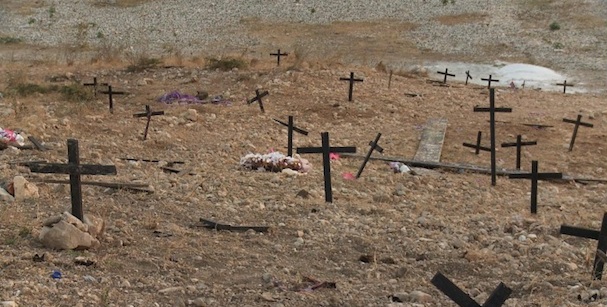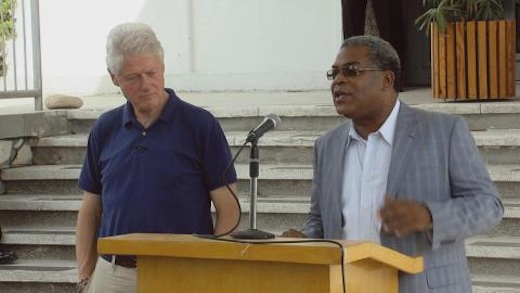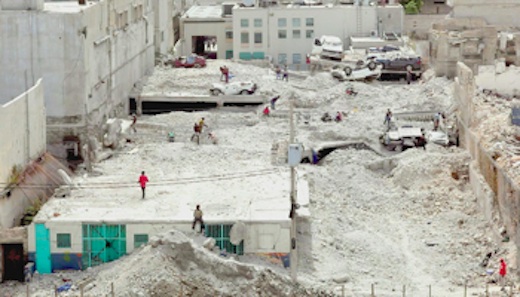“Help,” as it turns out, is not on the way when it comes to Haitians post 2010 earthquake. Promised eleven billion in aid that never arrived, the nation was a victim of not only natural disaster but a man-made one, which Raoul Peck details in Fatal Assistance. The film has its U.S. premiere at the San Francisco International Film Festival, which opens today. Peck, the creator of political thriller Lumumba (2001) is a fearless filmmaker and Port-au-Prince native who now spends his time in France, the U.S. and Haiti, where he served for a short time in the mid-1990s as Minister of Culture. In this interview, which was conducted when the film played Berlin this past winter, Peck makes the case for passionate, point-of-view filmmaking. Unfortunately, he reminds us, some points of view are buried. “Places like Haiti and an overall two-thirds of the world don’t have access to their own storytelling. We don’t own our stories.”
Keyframe: How and when did you decide to make a film about the catastrophic earthquake and its even more catastrophic aftermath in Haiti in 2010? Was it an immediate impulse?
Raoul Peck: My reaction to catastrophes is not as a filmmaker but as a human being. My first thought is not that I have to film this, my first thought is with my people. But then after a while I realized I am useless, I am just standing there and cannot help. So I turned to what I can do and what I know best. And before plunging into depression, I took the camera and stood aside and documented what was happening. So this is what I did for two years, just observation. I used my camera and my access to all-important players: the UN organization, normal people, the government of Haiti—everyone. And my goal was to just give everybody a chance to say what they had to say and to show what they are doing. And that is how the film started. I had no agenda, no idea about the result. I just watched.
Keyframe: How was the reaction to you and your camera observing what was happening?
Peck: Well, I always made sure to have everybody’s authorization. The one of the people and also the one from high up, meaning the president of Haiti, the prime minister, the head of the UN, all the ambassadors etc. I’d go into meetings and so on and just say, ‘Hi, I am Raoul Peck, I am doing a film on the reconstruction of Haiti, I am here for the long run, you will see me very often. Don’t mind me, I am just in the room. I am not a journalist, I am not judging. I am doing this film for the next two, three years. So by the time the film is out you will all have moved on. So please don’t worry about anything you say or do. It is not about you right now, it is about history in the making, it is about something bigger than all of us.’ People would accept that quite easily.
Keyframe: And then what? How do you try to document such a huge historical process?
Peck: I shot everything and everyone in the beginning. We have like 500 hours of material. Then after some months I identified the more important and interesting stories and followed them along the way. I had no idea what was going to be important and what not so I covered it all for the first year and then went with what I learned. The absurdity of the situation is that when you are embedded in institutions, companies and places, everything seems to make sense. They all had answers as to why things are going wrong. In their own logic it makes sense. But I put all these logics together and nothing made sense. This is when you understand that it is about the structure, the big machine and the little machines inside of it. That big machine is a bulldozer and it is blind to what it is doing. It is the dreams of people, the strange visions of others and they make no sense.
Keyframe: What kinds of visions do you mean?
Peck: A simple example is the idea someone had that we should construct plastic houses so that Haitians can assemble them themselves, which would create jobs. You see, so many ideas of people are simply projected into this catastrophe! And most do not make any sense!
Keyframe: But if you observe all this for so many years, you also become involved and a part of this machine. How can you keep a distance to the subject matter you are filming?
Peck: (Laughs.) Oh, don’t get me started on objectivity! There is no such thing. Nobody is objective; we all have an agenda, whether consciously or unconsciously. It is all about the storytelling. Unfortunately, places like Haiti and an overall two-thirds of the world don’t have access to their own storytelling. We don’t own our own stories, we don’t tell our own stories. See, I am now an old filmmaker so I have no problem to be totally subjective. I have so much catch-up to do in terms of telling my own story, so the only efficient way to do it is to tell it how I feel it. You know, I did my homework. I spent years with this project talking to everybody and making clear that I will not interfere. But of course at one point I do need to make my point, I do need to say, ‘Here, this is what I think. This is my conclusion.’ However, I try to let enough room for people to come to their own terms with the story.
Keyframe: Your conclusion is that the system of foreign aid is not working…
Peck: Yes, and it is clear that many NGOs know that. And they also know what changes would need to be made in order to fix this but they cannot do it because they are in a structure that does not allow for change. So if the result is that people see my film and then decide not to give money to NGOs anymore, then yeah, that’s that! Because people need to realize that this ‘help’ is not helping. Down the line it is creating bigger problems! And when these bigger problems arise nobody is there anymore. Or worse, and this happens right now – they blame it on us. Because we are corrupt, because we are impossible, because we are ignorant etc. So at one point it has to stop. So coming back to objectivity: there is none, because right from the beginning there is this machine, which owns the storytelling. And I don’t only mean Haiti. It is everywhere: Indochina, Africa or any country that has suffered such a catastrophe. Just one thought: we all have seen how the US government dealt with their own catastrophes like Katrina and Sandy. Now, imagine how things are in Haiti.
Keyframe: You do give a voice to the people though. And it is not only your voice but also the voice of one of the disillusioned workers. There is this dialogue which you use as a voice-over….
Peck: You see, I have to explain something to people that already have an opinion and whose minds are invaded with images of this place. In order to deviate this image I need to be credible. Also form and poetry are things that are important to me as a filmmaker. So I cannot simply write down a commentary. I am not a journalist. So, the idea for the voice-over came very late in the film. For more than a year I thought the film would certainly explain itself. But then I realized it is not working, I need to intervene. With my own voice reading out of my daily journal, but also with other voices which I took from conversations. It adds another layer, one that derives from what happened in the moment, which contains the mood of the time. This mood for me adds much more reality and credibility to the images and guides the viewer and pulls everything together. And I hope people will not just watch the film and put it aside. I want people to engage and to discuss. I want to interact. I want us to be taken seriously. Stop taking us for dummies, stop taking my people for stupid people! Stop showing our sadness, our dead bodies.
Keyframe: There are no dead bodies in your film…
Peck: No because those images are empty. I try to set counter-images. I show Haitian doctors working in Port-au-Prince. Not white doctors helping little black babies. Black doctors. Tell me, have you ever seen images like this? I reclaim images. Every image is important.
Keyframe: So, I have to ask – how much influence and power do you think you as an artist have?
Peck: Well, I do not believe that film can change things, but this one at least will leave people shocked and thinking. This film will have an impact because questions will arise and people will demand responses – especially from the NGOs. I mean, this earthquake was a worldwide event. Every country gave money, so every normal citizen had an emotional connection to Haiti. So this goes much deeper than many other catastrophes. And they will see that the problem is not the catastrophe, the problem starts with the donors.
Beatrice Behn is a German film critic, curator and festival director of the International Comedy Film Festival.






